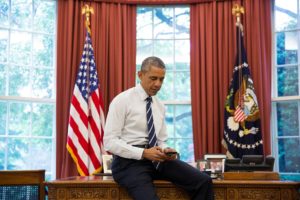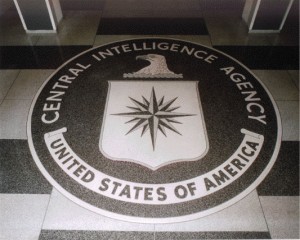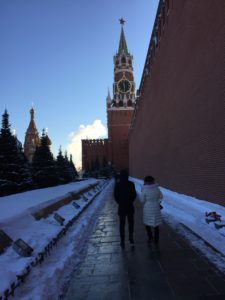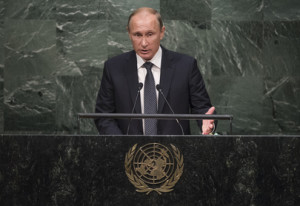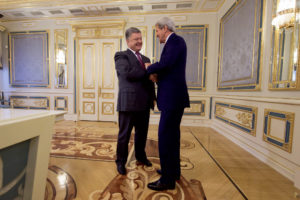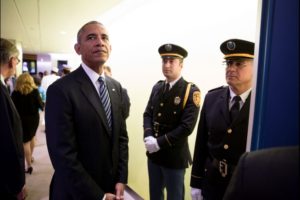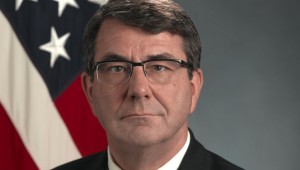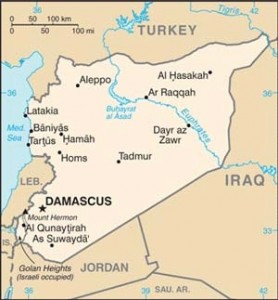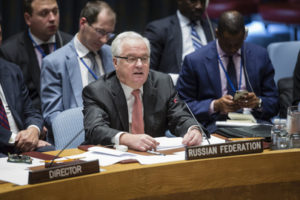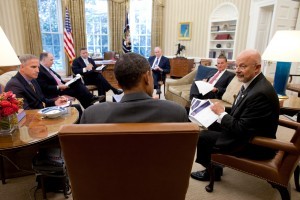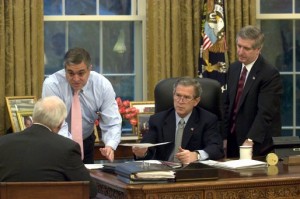https://consortiumnews.com/2017/01/28/deep-state-vs-donald-trump/
Deep State vs. Donald Trump
President Trump has stepped onto a high-wire in defying America’s Deep State, but can he withstand the powerful winds that will surely buffet him and what will President Putin do to help or hurt, asks ex-British diplomat Alastair Crooke.
By Alastair Crooke
Russian President Vladimir Putin has said it often: the door to co-operation (with the U.S.) “lies ajar.” He has said it repeatedly: that it was not Moscow in the first place that had withered – and then severed – the lines of communication with Washington. And Mr. Putin has been consistent in periodically easing the path to “Moscow” for President Trump.
(The Americans had hinted recently that they might appreciate “a gesture” from the Russians – and they got one: Russia invited the incoming U.S. administration to the Syria talks, at Astana. Moscow made this gesture – even at the cost of almost losing their Iranian ally’s support at the talks.)
Perhaps it is this “door ajar” stance by Mr. Putin that has given rise to the idea, in much of the press, that détente between the two leaders is somehow a “slam dunk” bet — that Trump and Putin are cut from similar cloth, and will somehow end up bashing Islamic radicals together. If that is the consensus, then it is perhaps premature, and possibly wrong.
The door is indeed “open,” and it is possible that the two leaders may indeed conjure up a détente. But it is no “slam dunk” (certainty). And Moscow certainly does not regard it to be “slam dunk” – at all. On the contrary, they are aware that whereas there are areas of common approach, there are also areas of obvious difference – and possible disagreement – between the new U.S. administration and Moscow. The hope for détente ultimately may prove to lie just beyond reach. We shall have to see.
We do not know what President Trump’s foreign policy – in practice – will be. It is not at all clear (intentionally so, in part. But, also because the details have not yet been thrashed out within the team, who are busy with managing a complex transition). Nonetheless we can tease out, perhaps, a few solid pointers in the wake of the new U.S. President’s inaugural speech:
–Mr. Trump has witnessed America’s political and economic decline over the years (he made plain previously his concerns about America’s deteriorating situation in his 2000 campaign publication).
–He sincerely believes the U.S. to be in crisis – and that without radical, urgent and comprehensive reform, America (qua “America”) will be in peril. He is, as it were, someone who has looked upon decay and corruption, and been transfigured by that which he saw: Yes, there was a Cromwellian “New Model Army” whiff to his inauguration speech. He said that he intends to purge – and then to remake – America, no less.
–He has arrayed against him the still intact power of the Deep State, yet he chooses mainly to taunt them. His inaugural speech told the Deep State flatly to prepare for its own disempowerment. He has thereby “burnt his bridges” in respect to any subsequent Faustian sale of his soul. He can only succeed, or dramatically fail.
–For all the pomp of an orderly transfer of power on Jan. 20th, the reality behind the trappings is one of a “state of war” between the U.S. President and the still-present Deep State elites (but not necessarily the Deep State’s foot soldiers, many of whom, it appears, voted for Trump).
Political Tactics
Artemis Capital presciently describes Trump’s likely political tactics: “Trump knows that if you can’t win [as matters stand], then you change the rules of the game – this is what he has already done with American politics – and what he is about to do to the entire Post-Bretton Woods World Order. If you really want to know a person, watch what they do, and not what they say … or what they tweet … the rants and twitter storms are part of a strategy of media control and distraction.
“Trump’s business career was largely comprised of three core strategies 1) Leverage 2) Restructure 3) Brand … in that order. Throughout the late 1970s and 1980s Trump rode a generational decline in interest rates and debt binge to purchase a range of high profile real estate projects including the Grand Hyatt (1978), Trump Tower (1983), the Plaza Hotel (1988) and the Taj Mahal (1988). In the 1990s he went through a total of 6 bankruptcies due to over-leveraged hotel and casino businesses in Atlantic City and New York. In the 2000s he pivoted to move away from debt-driven property investments to building a global brand through the ‘Apprentice’ TV show.
“Trump will run the country as he ran his businesses …. He will lever, and lever, and lever, and lever … and lever … and then restructure his way to success, or whatever success is defined as, by the broadest measure of popularity at any given time. Trumponomics, if it delivers, will be a supply-side free for all: massive tax cuts, deficit spending to create jobs, financial and energy deregulation, business creation, and trade protectionism – all driving inflation. More importantly, Trump sees bankruptcy as a tool and not an obligation and will have no problem pushing the US to the limits of debt expansion. ‘I do play with bankruptcy laws, they’re very good to me!’ he once said.”
‘The Destructor’
And this is what – in broad outline – we already see. Trump’s tweets are “the destructor” element: Creating negotiating leverage through uncertainty. No one can be sure of Trump’s final aims, or his “bottom line.”
This is his strategy. The tweets are mini-grenades tossed into the mix, precisely to confuse, to distract, and to loosen up the existing “order” – and to make it more susceptible to negotiation – and to subsequent “re-structuring” – should initial negotiations hit a brick wall.
Similarly, with leverage. Trump has leverage: Most significantly, the U.S. is the globe’s biggest buyer of consumer goods; it possesses the world’s reserve currency, and controls all the Bretton Woods financial institutions, with all the privileges which that implies. It has the Federal Reserve and can manipulate other states’ currencies; the U.S. “owns” NATO, and the defense protection it does (or does not) choose to confer on other states; it has the biggest military; and is more or less energy independent. Not bad cards.
Trump may be expected to lever, and lever again, all these assets. He will pull out all the stops in the interest of putting America First, and returning jobs and manufacturing to America’s marginalized white middle- and blue-collar classes. He will lever this aim financially (i.e. debt, border taxes and tax incentives) too, as well as politically strong-arm America’s trading rivals.
Brand “America” will be advanced by all the tradecraft that Trump acquired though his “reality” TV show: distractions, surprises, and publicity stunts to create an aura of success – for he is determined to succeed. It is almost as if he feels he can lift the “animal spirits” of Americans, as it were, by willpower, and pithy, one-liner tweets. To an extent, he already has – to judge by polls on business confidence in the U.S.
A Method Behind Madness
The above account may imply that, with Trump, all policy will essentially be determined by the seat of his pants. But if that is what conveyed, it is only half the story. John Maudlin of Maudlin Economics provides this corrective:
“This is going to be a short letter summarizing my impressions from the last few days [in Washington talking with Trump’s transition team]. I think it might be easiest to present them in the form of a list.
“If you listen to the media you might have the impression that the Trump transition team is in complete disarray. Talking with leaders of the transition team certainly didn’t leave me with that impression. They have broken the transition process down into over 30 departments and have created a ‘landing document’ for each department. The analogy they are using is that this process is like planning an invasion, and they are going to hand the landing document off to the ‘beachhead teams’ who will then execute the plans.
“I was briefly allowed to look at (without actually being able to read) the plan for one cabinet-level department. It appeared to be about 100 pages plus of serious detail as to exactly what executive orders would need to be removed and added, what personnel would have to be replaced (both appointees and regular staff), what policies would need to be changed, and so forth.
“I was told that this level of planning was being done for every department. My impression is that there are a lot of people from various think tanks and others with experience in the presidential transition process who are involved in directing the plan for each department. That level of detailed planning doesn’t happen in less than two months. My guess is that some of that thinking has been going on for years, and now it can be implemented.
“That being said, we know that no battle plan survives contact with the enemy; and it was instructive to sit with Bill Bennett, who talked about his experience in trying to reform the Department of Education under Reagan. They were still dealing with personnel and policy issues a year later, and this was when the department was much smaller than it is today. And that is just one department.
“When I asked a key person how much of the overall plan would likely come to fruition, I got a rueful smile and a shrug. ‘If we even get half of this done in the first few years, that will be major reform’…
“Trump’s management style is going to drive the media (and admittedly, much of the country and the world) nuts. One person who has worked closely with Trump during the transition says it is a lot like the HBO show Entourage and not at all like the British sitcom Yes, Minister. Trump will have people in his entourage competing to give him the pieces of information he needs. In his business organization, he sets the vision and then hires people to execute that vision; and then he goes back to doing what we have seen him do so well, which is to create the brand and image.
“He is bringing in people to execute his vision, and he’s going to expect them to get it done. He will jump in when he thinks he’s needed or when he can add something to the process, but he will mostly be paying attention to his team’s performance.
“One assessment suggests that there is going to be more than the usual amount of personnel turnover in the first six months. The media will be writing about how Trump can’t keep people and about all the chaos in the White House and other parts of government. But from Trump’s perspective, and given his management style, that’s not necessarily bad in terms of his longer-term goal of changing things.
“We have not had a president with this type of management style in my lifetime. Since it’s not something that any of us are going to be familiar with, it is going to make some of us uncomfortable until we get used to it (and some people never will).”
Putin and Trump
Where does this put Russia? Is President Putin, then, cut from similar cloth, as many commentators suggest?
Superficially: Yes (but in other ways, no). President Putin too saw his nation in decline (the Yeltsin years). And yes, Putin also sincerely believed that Russia was in crisis when he assumed the Presidency.
President Putin did face Russian Deep State powers arrayed against him, but, unlike Trump, there was no public declaration of war against the Russian Deep State, but rather, the Russian President has made it his objective to try to “heal Russia,” and to keep the opposing Russian political poles from splintering away from the main trunk. In this respect, President Putin is no populist: there has been no metaphorical rallying of blue-collar “pitchforks and torches” against the Elites. Putin has preferred to out-maneuver his enemies in more discreet, less public, ways.
So the “chemistry,” if it transpires in the flesh, derives from something else. Steve Bannon, Trump’s close confidant, in a 2014 interview, said simply enough: The “very, very, very intelligent” Putin just “gets it.” He understands “us.” He can see what our various Tea Party Movements are about (this interview was before Trump was a Candidate). Putin can tell that a “revolution” in America and Europe is brewing, Bannon implies, and notes that the Russian President has been quietly, (and “cleverly”) positioning himself towards it, especially in Europe.
In other words, it is not so much the transactional possibilities that attracts Bannon to Putin, but a sense of dealing with someone who has an instinctive, almost telepathic, shared understanding of what Bannon and his Breitbart circle (now including Trump) are about, and how they view the world. This type of empathetic communication – if borne out by experience – does have a real potential to overcome otherwise difficult political differences.
Russia’s Hot Buttons
And political differences, there are. Major potential hurdles: The “America First” policy, and that of aggressively re-building the home base, will not ruffle President Putin one jot. He feels the same about Russia. Ditto for the America First energy policy. Mr. Putin will have no problems with that (there can be fruitful exchanges with Secretary of State-designate Rex Tillerson, who is leaving his job as Exxon-Mobil’s CEO, on this issue).
However, three issues could be very problematic: The first is Trump’s emphasis that the U.S. “military dominance must be unquestioned” since this directly touches on Russia’s own national security. Moscow does not seek an absolute “balance,” but a balance of esteem, and “strategic stability” with the U.S. Two, Team Trump says the president will not “allow other nations to surpass our [U.S.] military capability”; and (in a White House policy outline), “We [the U.S.] will also develop a state-of-the-art missile defense system to protect against missile-based attacks from states like Iran and North Korea.”
Russian Foreign Minister Sergey Lavrov has already warned that nuclear weapons, strategic stability and nuclear and strategic parity, will be the key issue in Russian-U.S. relations. And the third “hot” issue will be whether Trump is intent on driving a wedge into the strategic security architecture linking China, Russia and Iran. Again, any attempt to split the coalition, or to collapse the keystone of the Eurasian economic “arch” (One Belt, One Road), could sour any entente between Trump and Putin.
There is however another major consideration for Russia: Can he do it? And, should he fail, what would be the implications for Russia? Might Trump’s term in office be curtailed? Might the U.S. President be removed, and replaced by an administration that would pursue vindictive retribution against Russia, for having allegedly “sided with” Trump?
Trump is determined to pull out all the stops: to succeed, but it will not be easy. The headwinds are strong. Growth is proving elusive – globally – for a range of complex factors. It is not Trump’s fault. It’s just how it is.
Economic Challenges
And a Damocles’ sword hangs over his economic program: Yes, he will try to lever, lever and lever again, as it he did in his business career (infrastructure projects, tax breaks and higher spending). For sure it is going to be inflationary – and interest rates already are rising. What happens when 10-year U.S. Treasuries hit 3 percent or more? Will it be war with a “tightening” Federal Reserve? Will debt markets generally, enter crisis?
But really, this program can, and almost certainly will, spice up life (and equity prices), for some U.S. corporations, but can it reach down, in the only sense that ultimately matters for Mr. Trump – to the level of bringing home the jobs to middle-class and blue-collar America? Who will work these newly returned plants? Robots? Americans on $15 an hour, or Americans on $45 an hour (a well-paid hourly job)?
And if the latter, who is going to purchase the expensive products which these well-paid workers will manufacture? Fellow Americans presumably, but it will take many millions of consumers, themselves on $45 an hour, to afford these high price goods. But if it is Americans on $15 per hour, from whence will come the revived consumer “animal spirits” and free spending? And if it is ‘bots…?
And is “tough on China” really viable? Modern industrial supply lines are long, transnational and complex. If America plays tough with end-product locus of manufacture, Asia can hit back in the supply lines. A whole supply line is much harder to pick up and put down elsewhere – than is one single plant.
More salient is the question: does China in fact have the economic “fat” to afford to part with some of it, to please America? Parts of America have been suffering from the effects of globalization, but now China has begun to be globalization’s latest victim, too. China may not have any “fat” to negotiate away. And China certainly does have “cards” of its own.
We have entered upon a bold experiment. Is it fully thought through, though? The Russians must be wondering, too.
Alastair Crooke is a former British diplomat who was a senior figure in British intelligence and in European Union diplomacy. He is the founder and director of the Conflicts Forum.



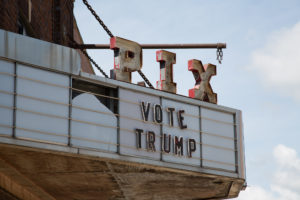

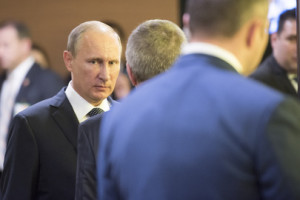
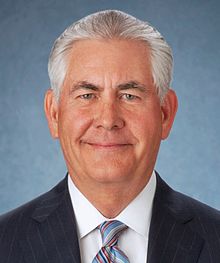


 This article was written for the Unz Review:
This article was written for the Unz Review: 
 In the meantime, the Soros crowd has already chosen a color: pink. We now are witnessing the “
In the meantime, the Soros crowd has already chosen a color: pink. We now are witnessing the “


